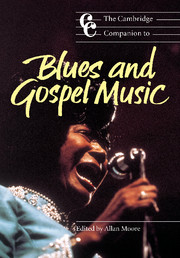Book contents
- Frontmatter
- 1 Surveying the field: our knowledge of blues and gospel music
- 2 Labels: identifying categories of blues and gospel
- 3 The development of the blues
- 4 The development of gospel music
- 5 Twelve key recordings
- 6 “Black twice”: performance conditions for blues and gospel artists
- 7 Vocal expression in the blues and gospel
- 8 The Guitar
- 9 Keyboard techniques
- 10 Imagery in the lyrics: an initial approach
- 11 Appropriations of blues and gospel in popular music
- Notes
- Bibliography
- Selected discography and videography
- Index
- Plate section
1 - Surveying the field: our knowledge of blues and gospel music
Published online by Cambridge University Press: 28 September 2011
- Frontmatter
- 1 Surveying the field: our knowledge of blues and gospel music
- 2 Labels: identifying categories of blues and gospel
- 3 The development of the blues
- 4 The development of gospel music
- 5 Twelve key recordings
- 6 “Black twice”: performance conditions for blues and gospel artists
- 7 Vocal expression in the blues and gospel
- 8 The Guitar
- 9 Keyboard techniques
- 10 Imagery in the lyrics: an initial approach
- 11 Appropriations of blues and gospel in popular music
- Notes
- Bibliography
- Selected discography and videography
- Index
- Plate section
Summary
Blues and gospel are widely familiar as generic labels, and have extensive histories both in their own right and as genres influential on other forms of music. They emerged within oral traditions of African American culture, embodying interpretation of, and responses to, experience in two differing realms (broadly, the secular and the sacred). They were then both taken up by the music industry and disseminated particularly from the 1920s. We know them through recordings, particularly, but their surrounding circumstances we know through writings. In this introduction, I want to lay out some of that knowledge, raising a few of the key questions as to how these genres function.
Although many books devoted to them treat them as separate, if related, genres, in this book we acknowledge their deep linkage. Indeed, Samuel Floyd (1995: 6) goes so far as to insist that they originated in exactly the same impulses, and that they are therefore alternative expressions of the same need. This is such a crucial issue that it is worth focusing on it straight away. Take the music of the Rev. Gary Davis. Was he a blues singer? Was he a gospel singer? In listening to him sing “Twelve gates to the city,” to which genre are we responding? His guitar playing provides both the solid sort of underpinning we might expect from a street musician, together with flashes of virtuosic brilliance and moments of call-and-response patterning (that wonderful bass scale), and extensive bent thirds. The structure and content of the lyric, however, are far from this – the “city” is celestial, not earthy. Or take an avowedly blues singer.
- Type
- Chapter
- Information
- The Cambridge Companion to Blues and Gospel Music , pp. 1 - 12Publisher: Cambridge University PressPrint publication year: 2003



